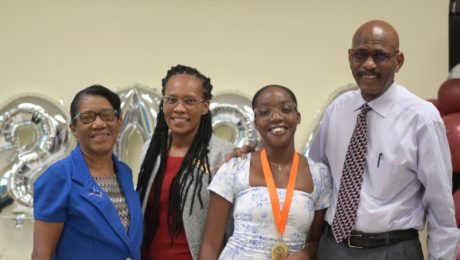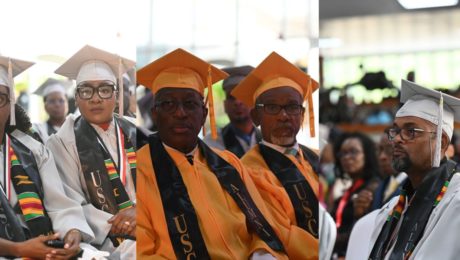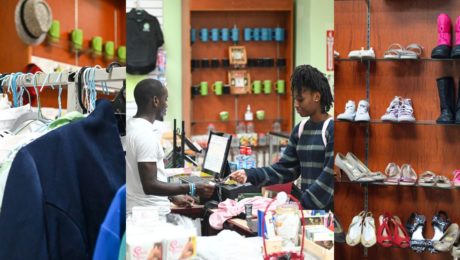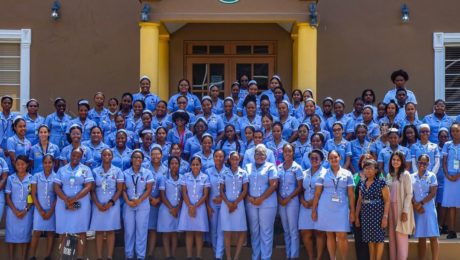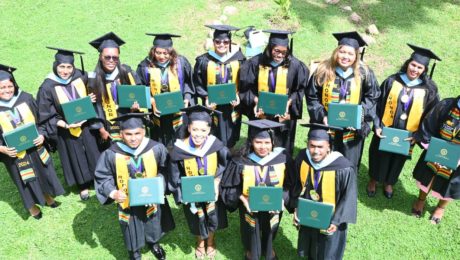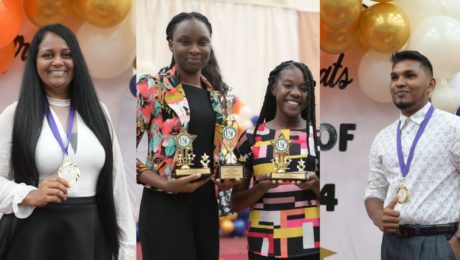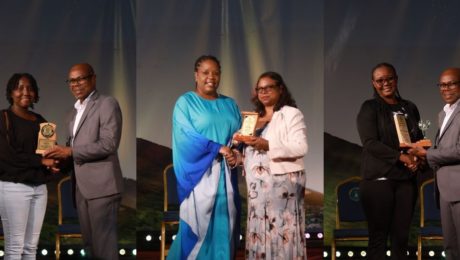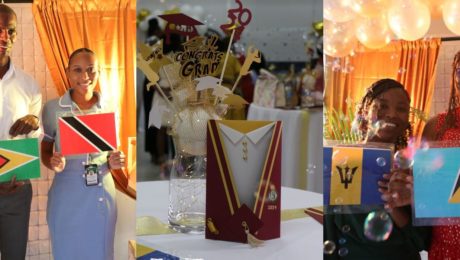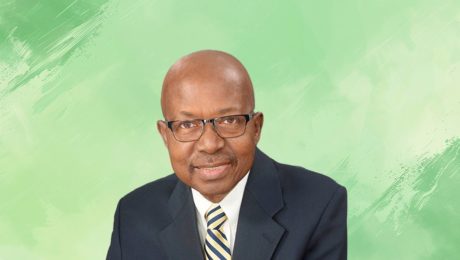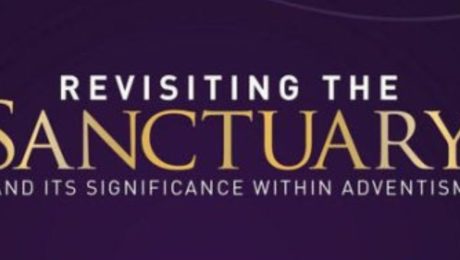USC’s School of Business and Entrepreneurship Celebrates the Class of 2024
By Ms. Sherri-Lyn M. Legall, Dean(Interim), School of Business and Entrepreneurship
Each year the School of Business and Entrepreneurship (SoBE) celebrates with its graduating students the achievement of their program completion. The SoBE holds its distinguished graduation function the week preceding graduation to include students traveling from abroad to graduate. This year the function was held on June 25.
The President and Provost, Dr. Wilson and Dr. Archer delivered in-person commendations and appreciations to students for making USC their institution of choice for their higher education, offered congratulations and ways for students to remember their alma mater.
At this function the SoBE presents graduating students with SoBE medallions, usually pre-ordered by students. Faculty of the SoBE take turns in placing the medallion on each student. The SoBE additionally awards the top student for each undergraduate SoBE major. Top students must achieve a cumulative GPA of 3.5 or higher in order to receive a special medallion with their name and degree program inscribed as well as a special gift.
As part of the celebration each faculty of the SoBE expressed well wishes to graduating students and their loved ones – some faculty chose to be live and others via video. This is usually a delightful surprise to students.
Students also expressed their tributes to the faculty and staff of the SoBE which involved role plays, speeches and ‘trips’ down memory lane. Interspersed with musical items, alumni spotlight, special prayer for God’s blessing for the future, along with a MBA promotional segment the SoBE graduating students enjoyed mingling with their faculty and reflecting on memories of their academic journeys while taking photos.
The SoBE congratulates their 2024 graduating students on their perseverance – navigating a pandemic, changes in modality of learning and adjusting to returning to face to face school, during the former few years. We salute them!
- Published in News, President's Newsletter, School of Business
The Class of 1999: Celebrating Silver – 25 Years of Excellence and Impact
By Brigid Winter, Vice President, Class of 1999
Listen! Can you hear it? The nostalgic strains of Edward Elgar’s Pomp and Circumstance, evoking feelings of pride, triumph, and reminiscence! It is 1999, Sunday, June 20th, and a group of eager, excited, and relieved students adorned in gowns, caps, and radiant (some nervous) smiles are proudly marching into the auditorium. Soon, their names will be called and they will cross the stage to receive their diplomas.
This was the Class of 1999, a powerful cohort of 164 individuals—the then largest graduating class—representing five faculties and pursuing degrees ranging from Associates to Masters. Armed with ambition, faith, and an unwavering commitment to “the pursuit of excellence,” they stood ready to embrace the challenges of the new millennium and beyond.
Now, a quarter-century later, the Class of 1999 gathers to celebrate their silver anniversary, reflecting on a journey marked by steadfast determination and a shared motto: “God in, with, and beside us.”
From the outset, this class embraced a noble aim: to excel in every endeavour they pursued and undertook. Inspired by Philippians 3:13-14, they adopted a forward-looking mindset, leaving behind past achievements while eagerly reaching towards future aspirations. Their commencement theme, “Taking the mantle into the new millennium and beyond,” resonated deeply as they embarked on diverse paths in a world on the cusp of the new millennium. They would witness and be a part of the transition into the 21st century. What a unique and opportune position to be in, as the last graduating class of the 20th century!
Indeed, these graduates were poised for greatness, and filled with optimism and a sense of boundless possibilities. The internet was beginning to revolutionise global communication, connecting people via email and early social media platforms, and expanding horizons in unprecedented ways. Equipped with the knowledge and skills they acquired during their academic tenure at the Caribbean Union College (CUC), they entered a rapidly evolving world, prepared to make a profound impact.
And make an impact they did! Many took to heart, the commencement speaker, Dr Delbert Baker’s charge to, “go, be a problem-solver.” In a time, which for many of them, was one of exploration and growth, the class of 1999 ventured into and excelled in various fields. They became educators, administrators, pastors, doctors, scientists, authors, and entrepreneurs, among various other roles. Their influence spanned continents, with some answering the call as missionaries in East Asia, while others pioneered businesses that thrived in the digital age. Many pursued advanced degrees, broadening their expertise and unlocking new opportunities, while some chose paths of public service, shaping policies and institutions. Some also stayed in service of their alma mater.
Ground-breaking and leadership are not new to the Class of 1999. During their time at CUC, the Channel newspaper, The Honours Society—Epsilon Phi Epsilon, The Business Club, and the Computer Science Club—Virtua, were established. Members of the class of 1999 were involved in each of these initiatives in leadership and other roles. Class members’ leadership extended to student governance, where some of them served on the Associated Student Body (ASB) and laid foundations for future generations through initiatives such as representation for day-students and the acquisition of a school bus.
One watershed moment comes to mind. Picture this: it is an ASB Chapel Day, and students are seated in the chapel, undoubtedly chatting as they wait for the program to begin/proceed. Suddenly, a familiar and well-known drum intro fills the air, followed by the raspy, throaty voice of Mark Anthony Myrie, more popularly known as Buju Banton. I imagine students exchanging confused and doubtful glances and communicating both verbally and non-verbally, “No way are they going to play this song at chapel!” Then, as the music continues, there are hoots of agreement and some murmurs of displeasure, as many join Mr. Myrie in singing, “Only Rasta can liberate the people, over hills and valleys too. Don’t let them fool you. Don’t believe for a minute that they are with you…” It sparked a cheerful, sceptical pandemonium of sorts, as students joined the singing while wondering what was happening. To say this was unprecedented would be a gross understatement!
Approximately twenty-six years later, I asked the then ASB President, Mr. Leslie Hislop, what the ASB’s motive was in playing this particular song. What did they hope to accomplish? Was it just an attention grabber? In responding, he spoke of liberation being a conscious decision and highlighted the ASB’s determination to not just accept the status quo. The ASB, as the representative and voice of the student body, recognised the necessity for change in various areas, and saw it as their responsibility to address these issues with the administration. In doing so, they inevitably challenged established norms and pushed boundaries to effect the required changes on behalf of the student body. The song, a widely recognised and loved one, was a means of prompting reflection on the concept of liberation and its attainability, parallel to the changes that the student body sought. The title—Hills and Valleys—was a perfect fit; not only would it resonate with personal struggles and triumphs, but it also wonderfully reflected the geographical context of the beloved CUC campus nestled in the hills of the Maracas Valley. This moment marked a pivotal juncture for the ASB, elevating it to a role where it was perceived as capable of effecting actual, meaningful change for the student community. In contemporary terms, we would undeniably describe the student body executive as positive disruptors!
As the Class of 1999 gathers to commemorate their silver anniversary, they not only reflect on pivotal moments such as those previously mentioned, but also fondly remember and honour their classmates who have passed on, including their esteemed Class President, Mr. Clive Smith. Though departed, their legacies endure through lasting contributions, serving as poignant reminders of life’s fragility and the enduring impact of individual actions. The class also values the opportunity to give back to their alma mater, and so, in memory of their Class President, they will gift the University the funds equivalent to the cost of a dorm room to be named in honour of their Class President, Clive Smith.
Reflecting on the last 25 years, the Class of 1999 remains committed to their foundational principles. As problem-solvers and positive disruptors, they confront challenges with resilience and creativity, hoping to inspire those who follow with a legacy of service and influence. As they celebrate this milestone, they are reminded that their journey continues, guided by faith and the assurance that God accompanies them in every endeavour. They continue to be trail blazers and even as they take in the commencement exercise, two members of the class are making history: their children are graduating 25 years later, on their parents’ silver anniversary!
Look! Watch, as this time, 25 years later, they again march proudly and joyfully out of a ‘new’ air-conditioned auditorium, as if it were 25 years earlier. They exude the same zest and passion for life. They are filled with thoughts and aspirations of continuing to make their mark, continuing to make a difference, and impacting the world in their pursuit of excellence. If you were sitting amongst them earlier, you would have heard whispered snippets of ‘…Who? Alumni Association, revive, vibrant, we should…’ There is a pervasive spirit of camaraderie, friendship and shared experiences among them. They warmly welcomed the two lone members of the Gold Class into their group, as it if had been that way all along. The ‘real’ school song has been on their lips and ringing in their heads and hearts, and as they gather to take the ‘must-have’ photos, they are overcome with memories of times past and happily burst into song! Listen…
“Our dear ‘ole CUC our hearts are loyal beating.
To thee we’ll ere be true.
And though the years be swiftly fleeting this fond pledge we’ll give to you.
That we will ever be staunch and faithful bringing tribute without a fail.
To our dear college, our dear ‘ole CUC we hail.
All hail!”
Members of the Gold (1974) and Silver (1999) Classes at USC’s 91st Graduation Commencement Exercise
Feelings of joy, pride, sentimentality and nostalgia are aroused, and in that shared moment they are invisibly bound closer together.
Looking ahead, they embrace the future with optimism and gratitude, knowing their lives are defined not just by personal successes, but by their indelible imprint on individuals, communities, and the world at large. Theirs is a narrative of faith, perseverance, and an unwavering pursuit of excellence—a story they hope will inspire and challenge us all.
Here’s to the next 25 years—a future filled with continued success, joy, impact, excellence, positive disruption, and the pursuit of new dreams. “But one thing [we] do, forgetting those things which are behind and reaching forward to those things which are ahead, [we] press toward the goal for the prize of the upward call of God in Christ Jesus.”
See you in 2049 as The Gold Class of 1999, God willing! But, before then, there is talk of meeting again at the 100th anniversary of our dear ‘ole CUC (now USC).
Signed, The Class of 1999.
Back Row, L-R: Marcia Edmund-Woods, Susan Popoola, Brigid Winter, Michelle Bailey, Avion Thomas, Earleen Davidson-Bobb, Vernessa Gaines-Cuffy, Jacinthah Williams-Cunningham, Candy Springer-Blackman, Clairene McDavid, Beverly Hurdle-Brown, Lesli-Marie Arthur, Sharon Walker-Gajadhar, Ayoola Marshall, Leonie Caddle, Joyette Garraway, Nicole Ottley.
Front Row, L-R: Carey Benjamin, Leslie Hislop, Pr. Silton Browne, Colville St.Hilaire, Curtis Gosein, Makesi Alexander, Loris Scobie.
Photo Credit: ScobServices: Scob Photos
- Published in News, President's Newsletter
A Call to Donate: Supporting the USC Thrift & Convenience Store
By Mrs. Sharon Ramkissoon-De Freitas, Director of Business Development
The word philanthropy is rooted in two Greek words: *philein*, meaning to love, and *anthropos*, referring to humankind. Thus, philanthropy embodies the love of humanity. It is often said that while one can give without loving, one cannot love without giving, for love, fundamentally, is a verb. As followers and ambassadors of Christ, it becomes almost second nature to live our lives expressing philanthropy through giving.
Reflecting on this principle, many of you reading this have committed yourselves to making the world a better place by sharing your time, knowledge, resources, and very lives for the betterment of your communities. Your efforts do not go unnoticed, and you are deserving of the highest commendation and deepest appreciation. Thank you for what you do. Thank you for what you give. Thank you for caring. Thank you for responding to the call to make a difference.
Human needs are endless, and so are God’s blessings. As I once read on a tea cup, “Give what you have; it may be better than you think.” This sentiment has been proven time and time again during my tenure at USC. Donors and patrons, united by a single item, experience the joy and blessing of giving, mirrored by the joy and blessing of receiving.
As USC prepares to relocate its thrift store to the newly renovated ‘barn’ and expand to include an on-campus grocery and convenience store, we issue a call to our USC alumni, community, and friends to express their love of humanity through giving.
We invite you to donate items such as clothes, shoes, toiletries, foodstuff, and household items, as even the smallest contribution can have a significant impact. It might be better than you think.
Donating to the USC Thrift & Convenience Store is easy:
- For local donors, please call Mrs. Sharon Ramkissoon-De Freitas at 682-4299 or 662-2241 Ext. 1211, and arrangements will be made to collect items.
- If you are abroad, collect items, box or barrel them. Call Laparkan Shipping Company and address them to Ms. Peggy Guerrero, University of the Southern Caribbean (USC), Royal Road, Maracas, St. Joseph, Trinidad. Tel.: 1-868-471-7111.
Your generosity and love can transform lives. Join us in this philanthropic mission, and thank you for answering the call to donate.
- Published in News, President's Newsletter
USC Nursing Department Pinning Ceremony 2024: A Celebration of New Beginnings
By Dr. Phyllis Woolford, Chair, Department of Nursing Education & Ms. Simone Augustus, Corporate Communications Officer
On Thursday, June 27, 2024, the University of the Southern Caribbean’s (USC) Nursing Department held its annual Pinning Ceremony, a significant pre-graduation event that lasted two and a half hours. Themed “Celebrate Endings for They Precede New Beginnings,” the ceremony symbolically marked the transition of nursing students from their roles as students to practicing professionals.
The Pinning Ceremony is steeped in history, tracing its roots back to the 1860s when Florence Nightingale was awarded the Red Cross of St. George for her exceptional service during the Crimean War. This tradition was later institutionalized at the Nightingale School of Nursing at St. Thomas’ Hospital in London, England. Today, it continues to be a cherished ritual, where dignitaries and qualified personnel ceremonially pin the distinctive USC Nursing Pin on the left lapel of each graduating student’s uniform.
This year’s ceremony saw the graduating class standing with lit candles, reciting the Nurses Pledge, a moment that highlighted the solemnity and importance of their new roles. The program was filled with memorable moments, starting with the feature address by Mrs. Shema Alexander-Campbell, Nursing Administrator at the Ministry of Health. Her speech was filled with inspirational insights and encouragement for the new graduates.
Special music performances added to the ceremony’s beauty, including an outstanding duet by Ivana Wong and Denicia Ottley. Another highlight was the Valedictorian speech by Ms. Ariel Ransome, which resonated deeply with all attendees.
The event also included the presentation of awards. Mrs. Maureen Giddings-Estwick was honored with the Distinguished Service Award for her over 50 years of dedicated contribution to the field of nursing. Additionally, twelve students, six from the Main Campus and six from the South Campus, were recognized for their outstanding performance in various categories: Punctuality, Citizenship, Clinical Performance, Spiritual Awareness, Academic Performance, and Class Representation.
Reflecting on their journey, students shared heartfelt testimonies. Olivia Springer recalled how the scriptures planted throughout the USC campus provided her with comfort and strength during her studies, expressing gratitude for the supportive environment that made her academic success possible. Jardel Phillips spoke about the challenges and rewards of being a male nursing student, highlighting the importance of breaking stereotypes and the strong bonds formed with classmates and healthcare professionals.
“I remember the day I first visited the campus, For me, it was the scriptures that were planted throughout the lawn, it was the scriptures throughout the halls, it was those said scriptures that gave me comfort and strength throughout my time at USC. I couldn’t have done it without Jesus and USC made that easy.” – Olivia Springer
“Life as a male nursing student involved breaking stereotypes and often being in the minority. It has been hard balancing rigorous academics and clinical rotations while showcasing capability and compassion. The experience has been rewarding, and has led to many new relationships with healthcare professionals already working in the field and strong camaraderie with classmates.” – Jardel Phillips
As the Pinning Ceremony concluded, the gratitude towards the entire faculty and staff of the Nursing Department was palpable. Their incredible support and dedication over the past four years played a crucial role in the students’ success. The meticulous planning and execution of the event were a testament to their commitment to the future of nursing.
In the words of the featured speaker, Mrs. Shema Alexander-Campbell, “Be the best your colleagues expect. Endings aren’t roadblocks; they are bridges leading us to unexplored horizons. Step forward with strength and mindfulness, knowing that this ending is just the beginning of a new chapter.”
The Pinning Ceremony of 2024 will be remembered as a significant milestone in the lives of the new USC nursing graduates, symbolizing not only the end of their academic journey but the beginning of a promising career in healthcare.
USC and Guyana Celebrate Educational Milestones at GOAL Graduation
By Ms. Simone Augustus, Corporate Communications Officer
The University of the Southern Caribbean (USC) has marked a significant milestone in its partnership with the Cooperative Republic of Guyana through the Guyana Online Academy of Learning (GOAL). This collaboration has been instrumental in providing Guyanese citizens with access to quality undergraduate and graduate education, supporting the government’s vision for a well-educated workforce and offering a second chance to those who have not previously had the opportunity to pursue tertiary education.
The fruits of this partnership were on full display at GOAL’s graduation ceremony, held on Friday, May 24, 2024, at the Arthur Chung Conference Centre in Guyana. Over 1600 students from all ten administrative regions of Guyana received their certificates, a testament to the broad reach and impact of the GOAL initiative. This event marked not only GOAL’s second graduation but also a significant milestone for USC: the graduation of our first cohort of students from our programs through GOAL.
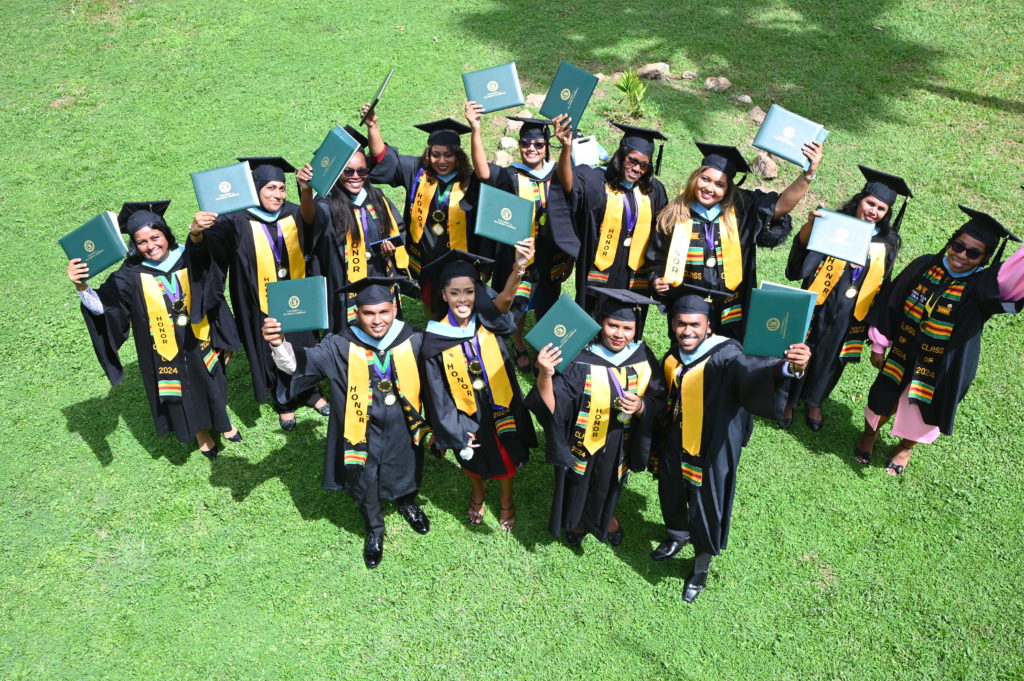
His Excellency Dr. Mohamed Irfaan Ali, President of the Cooperative Republic of Guyana, delivered the feature address, emphasizing the importance of accessible education in building a robust, knowledgeable society. The President’s speech underscored the government’s commitment to providing opportunities for higher learning to all Guyanese, a vision that GOAL is steadily fulfilling.
A highlight of the ceremony was the speech by Valedictorian Ms. Rohanie Beeram, who earned her Master of Business Administration from JAIN University. Ms. Beeram’s inspiring words resonated with the graduates, as she shared her journey of perseverance and success.
USC President, Dr. Colwick M. Wilson, attended the graduation in person to extend his congratulations and to celebrate the achievements of the eighty-five students who completed USC’s programs through GOAL. In his remarks, Dr. Wilson praised the graduates for their dedication and hard work, and highlighted the importance of education in driving personal and national development. Dr. Wilson’s presence underscored USC’s commitment to this partnership and the success of its students. He also participated in the distribution of certificates, personally handing them to the proud graduates.
Ps. Onesi La Fleur, Vice President for Student Services and Enrolment Management, also in attendance remarked, “The successful completion of these programs by eighty-five dedicated students represents the beginning of a new chapter in USC’s mission to provide quality education beyond our borders. Through this partnership, we have had the invaluable opportunity to export USC’s educational experience to the citizens of Guyana, enhancing their academic and professional journeys. USC is committed to continuing this journey and to expanding educational access through GOAL. Together, we can build a brighter future for Guyana, one educated citizen at a time.” Also in attendance from USC was Ms. Leanna Alexander, Coordinator of the Special Education Program.
The programs offered by USC through GOAL have been carefully curated to address key areas of need within Guyana’s workforce. These programs include:
- Bachelor of Science in Nursing
- Bachelor of Science in Educational Services (Emphasis: Special Education)
- Bachelor of Science in Early Childhood Education
- Bachelor of Science in Elementary Education
- Bachelor of Science in Nutrition and Dietetics
- Master of Science in Occupational Therapy
This first cohort of graduates now holds an esteemed role as USCian alumni and institutional ambassadors. Their experiences and feedback have been instrumental in helping USC understand how best to serve the government and people of Guyana. Their achievements reflect the strength of this historic collaboration and pave the way for future students to benefit from the same opportunities. These degrees not only equip students with essential knowledge and skills but also prepare them to contribute meaningfully to their communities and the broader society.
“The collaboration between USC and GOAL is a testament to our shared commitment to empowering individuals by expanding educational opportunities,” said Dr. Wilson. “We are incredibly proud of our graduates and look forward to continuing our partnership with Guyana to support the academic and professional aspirations and development of its citizens.”
The success of this graduation ceremony underscores the positive impact of the USC-GOAL partnership and the transformative potential of online education. As more students take advantage of these opportunities, the vision of an educated and empowered Guyanese workforce becomes increasingly attainable.
As GOAL continues to grow and expand its reach, it stands as a beacon of hope and opportunity for many in Guyana, embodying the government’s vision of an accessible and inclusive educational system. This year’s graduation ceremony is a promising indicator of the effect strategic educational partnerships can have on a nation’s future and individual’s personal and professional growth.
- Published in News, President's Newsletter, Students
USC School of Education and Humanities Celebrates Graduating Teacher Trainees and Award Recipients
By Mr. Roland Sealy, Chair, Department of Teacher Education
The University of the Southern Caribbean’s (USC) School of Education and Humanities recently held two significant ceremonies, marking important milestones for its students. On June 20, 2024, the school celebrated the induction and pinning of graduating teacher trainees, and on June 25, 2024, it hosted its annual awards ceremony. These events highlighted the achievements, dedication, and future potential of USC’s students.
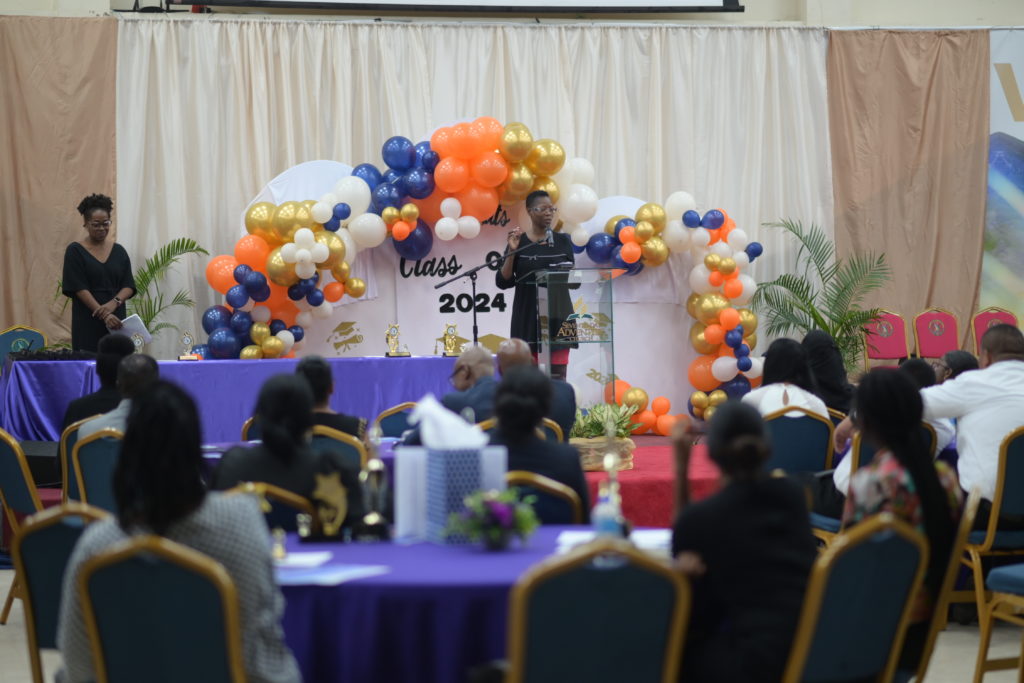
Induction and Pinning Ceremony
In a heartwarming ceremony on June 20, 2024, the School of Education and Humanities welcomed 15 future educators into the noble fraternity of teaching. Organized by the Department of Education, this event marked the induction and pinning of graduating teacher trainees, symbolizing a significant milestone in their journey toward becoming professional educators.
The evening commenced with opening remarks by Dean Loverne Jacobs-Browne and University Provost Dr. Len Archer. Both emphasized the importance of teaching as a profession and the vital role these new educators will play in shaping the future. Faculty, staff, teacher mentors, and proud family members attended, creating an atmosphere of excitement and anticipation.
Each of the 15 inductees was introduced by the Chair, Mr. Roland Sealy, through their personal bios, sharing unique journeys and aspirations. These stories of dedication and perseverance were met with enthusiastic applause from the audience, highlighting the strong sense of community and support within the department.
The guest speaker, Dr. Lynette Tyson-Noel, delivered an inspiring keynote address themed “From Then to Now to Where?” Dr. Tyson-Noel, a distinguished educator and author, shared insights from her own journey in education. She encouraged the inductees to reflect on their past experiences, embrace current opportunities and challenges, and prepare for the unknown future.
“Your journey as educators is just beginning,” Dr. Tyson-Noel remarked. “Remember to honour your past, live fully in the present, and remain open and adaptable to the future. Each phase of your journey holds valuable lessons that will shape you into the teachers you are meant to be.”
The highlight of the evening was the ceremonial placing of the purple stoles, the school’s colour, on the inductees. This symbolic act, performed by faculty members, represented the inductees’ readiness to take on teaching responsibilities. As each stole was placed, the room resonated with applause and cheers, marking the culmination of years of hard work and dedication.
Following the stoles, the inductees were pinned with the department’s teacher emblem, symbolizing their commitment to the profession. This pinning ceremony was both solemn and celebratory, as the inductees officially joined the ranks of educators. Faculty members who performed the pinning took pride in welcoming their former students as colleagues.
The evening concluded with a reception where inductees, faculty, staff, and family members mingled, sharing stories and offering congratulations. The sense of camaraderie and shared purpose underscored the strong bonds formed during the trainees’ time in the program.
As these new educators embark on their professional journeys, they carry with them the wisdom imparted by their mentors and the support of a dedicated community. The induction and pinning ceremony was not just a celebration of their achievements but also a reminder of the important role they will play in the lives of countless students. The ceremony highlighted the values of dedication, reflection, and forward-thinking that the School of Education and Humanities strives to instill in its students.
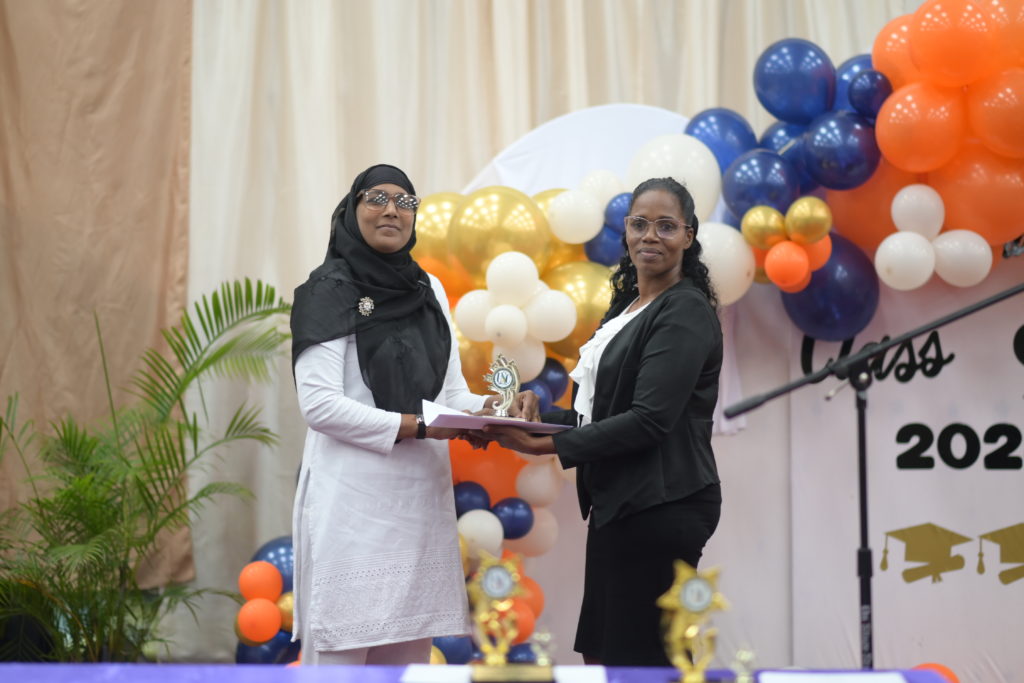
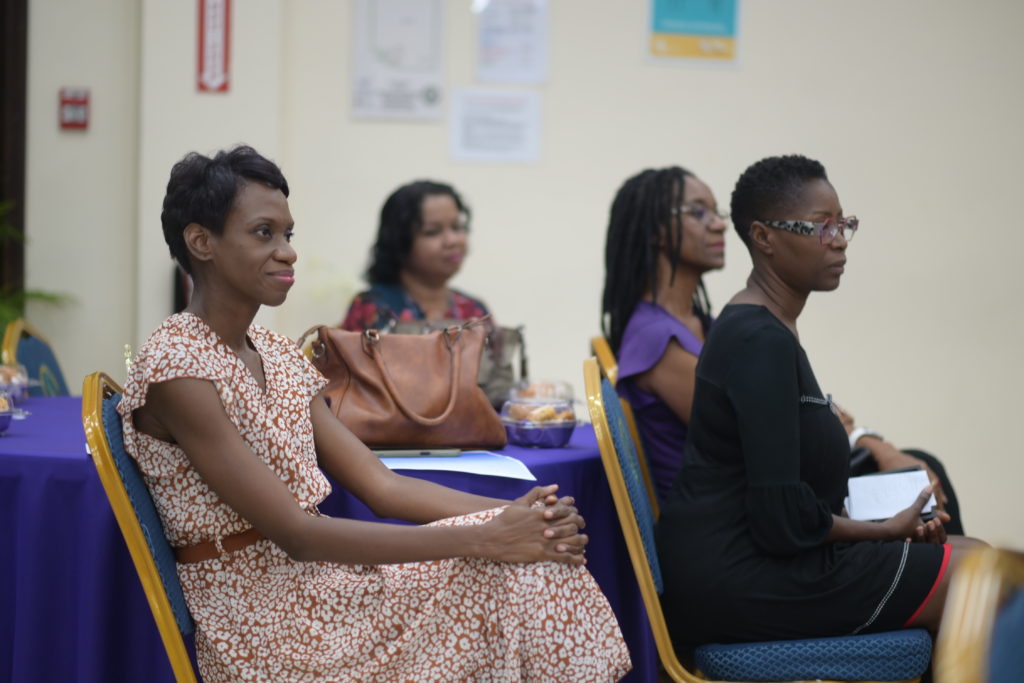
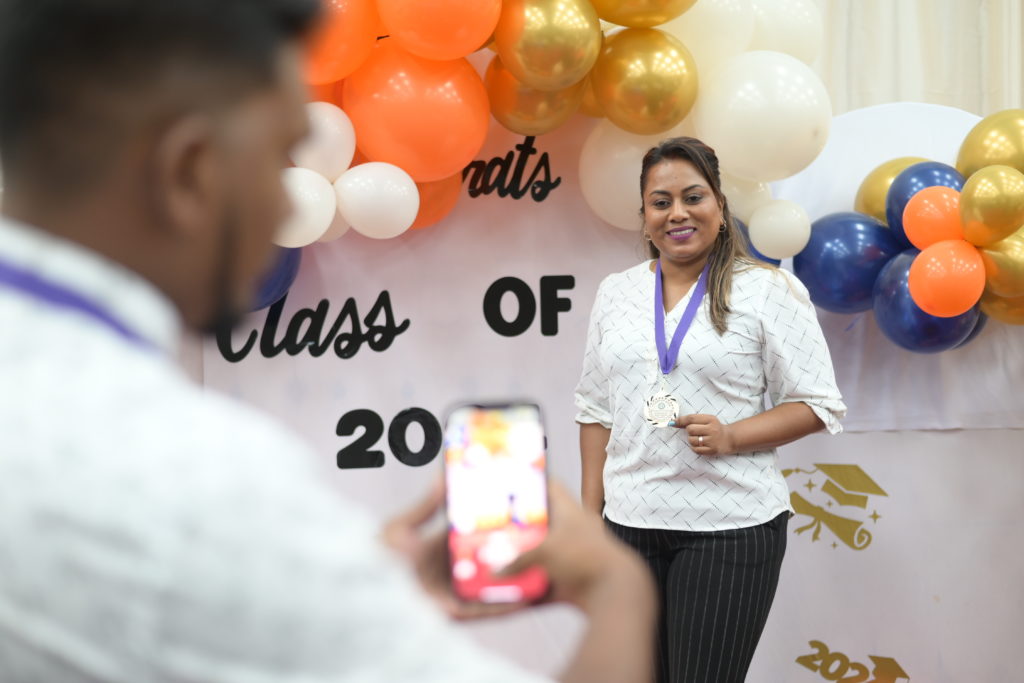
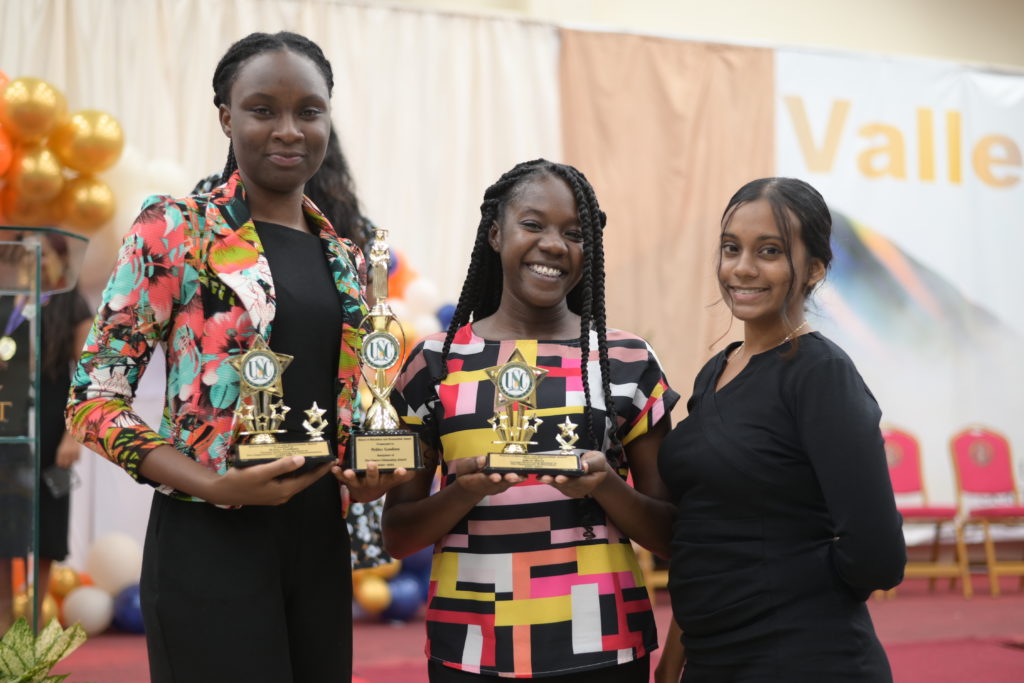
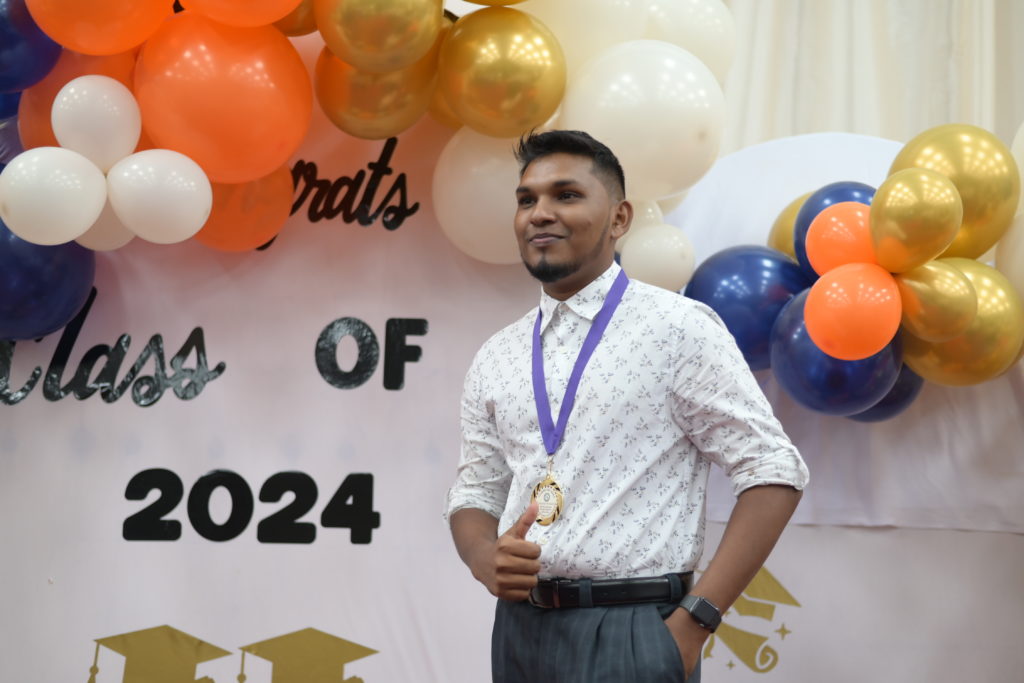
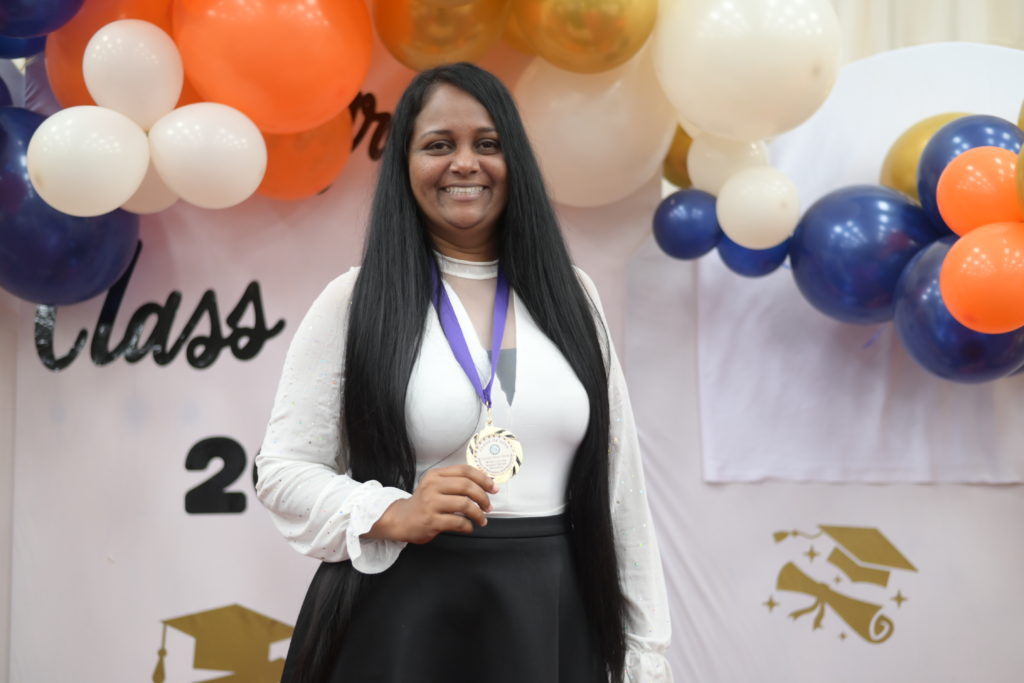
Awards Ceremony
On June 25, 2024, the School of Education and Humanities held its annual awards ceremony, recognizing outstanding students for their exceptional academic performance and significant contributions to the university’s ethos. This event was a heartwarming celebration of dedication, growth, and the pursuit of excellence.
Awards were distributed to students from the Department of Teacher Education, History, Music, and Humanities. The evening was a testament to the hard work and perseverance of students who excelled academically and embodied the values and mission of the University of the Southern Caribbean. These students not only achieved high grades but also demonstrated a commitment to the university’s core principles of integrity, service, and community.
The guest speaker, Pastor Nieve George, delivered an inspiring address that resonated deeply with both students and faculty. In his speech, George emphasized the importance of personal growth and authenticity in an era increasingly dominated by technology and artificial intelligence. He urged students to avoid becoming “Artificial Individuals,” a term he coined to describe people who lose their individuality and humanity in the pursuit of technological advancement.
“The more you grow, the more you grow those around you,” George stated, encapsulating the evening’s theme of growth and mutual support. His words encouraged students to embrace their unique journeys and contribute positively to the growth of those around them, fostering a community of continuous improvement and collective success.
Adding a touch of literary charm to the evening, George referenced the classic Hans Christian Andersen tale, “The Ugly Duckling.” He drew parallels between the story’s theme of transformation and the students’ educational journeys, highlighting how perseverance and self-belief can lead to profound personal and academic growth. This timeless story served as a powerful metaphor for the transformative power of education and the potential for every student to achieve greatness.
The ceremony also recognized the achievements of students from the GOAL scholarship program of Guyana. Thirteen of 85 graduating cohort in the Bachelor of Science in Educational Studies (Special Education) were present. Among them, Ms. Diane Gomes stood out with a stellar GPA of 3.98, earning her the title of Valedictorian for the evening. Her academic excellence and determination were celebrated as an inspiration to all.
Faculty and staff of the School of Education and Humanities were present, applauding the students’ achievements and sharing in the celebration. The evening was filled with moments of pride and joy, as awardees were called to the stage to receive their accolades amidst enthusiastic applause from their peers, parents, spouses, and mentors.
The awards ceremony was more than just a recognition of academic achievements; it was a celebration of the collective effort, growth, and spirit of the university community. It underscored the importance of nurturing not just the intellect but also the character and humanity of each student.
In the words of Pastor George, the evening reminded everyone present that “the more you grow, the more you grow those around you,” highlighting the powerful ripple effect of education and personal development.
As the new teachers step into their roles, they are well-equipped to inspire and educate the next generation, embodying the ideals of excellence and commitment that the School of Education and Humanities upholds.
- Published in News, President's Newsletter, School of Education & Humanities
School of Social Sciences Hosts Annual Gala Pre-Graduation Awards and Recognition Ceremony
By Ms. Sadia Moore, Chair, Department of Sociology and Psychology
On Tuesday, June 18, 2024, the School of Social Sciences at the University of the Southern Caribbean (USC) hosted its annual gala pre-graduation awards and recognition ceremony, setting the stage for the upcoming commencement celebrations. Under the inspiring theme “Determined Minds, Boundless Futures,” the event celebrated the remarkable achievements of graduating students, faculty, and staff within the School of Social Sciences.
Dr. Susan Chand, Dean of the School of Social Sciences, welcomed the attendees, including students, their families, faculty, and staff. Dr. Len Archer, Provost, and Ms. Joanna Thomas, President of Club SoSci and a member of the 2024 graduating class, extended their greetings and congratulations. The keynote address was delivered by Pastor Malvern Mentore, Adjunct Faculty member of the School of Social Sciences, who emphasized the importance of context and support in making significant decisions.
The ceremony featured special recognitions for outstanding achievements across various disciplines. Among the honorees were:
- Abigail Isaacs: Most Outstanding Student Award for Behavioural Sciences.
- Joanna Thomas: Most Outstanding Student Award for Criminology & Criminal Justice.
- Taquiah Gordon: Most Outstanding Student Award for Psychology.
- Kichelle Hernandez and Jaden Saunders: Most Outstanding Student Award in the Department of Social Work.
The prestigious Dr. Edward Thomas Clarke Outstanding Social Sciences Award, accompanied by a cash prize of $2,500, was presented to Nathalia Sam for her exemplary commitment to scholarship, community involvement, and extracurricular activities within the School of Social Sciences.
Additionally, students were recognized with Academic Excellence Awards based on their GPA:
- Gold: Gabrielle McKenzie, Psychology – Health Emphasis (GPA: 3.85)
- Silver: Naomi Harry, Behavioural Science – Psychology Emphasis, and Taquiah Gordon, Psychology – General Emphasis (both GPA: 3.84)
- Bronze: Trishana Layne-Williams, Behavioural Science – Psychology Emphasis, and Shamara Thomas, Psychology – General Emphasis.
Other special awards included:
- Sports Leadership Award: Joanna Thomas, for exceptional leadership in organizing school activities.
- Esprit De Corps Award: Daniel Anthony, for enthusiasm and commitment to upholding school honour.
- Excellence in Research Award: Leizle King and Nekedo Samuel, recognized for outstanding research contributions.
Taquiah Gordon, recipient of the Most Outstanding Student Award for Psychology and Academic Excellence Silver Award, reflected on her journey at USC: “This journey was not only about the academic achievements, it was about discovering passions, pushing my limits, and learning that without failure success doesn’t exist.”
Faculty members were also honored for their outstanding contributions to the institution and the community. Ms. Narsha James and Ms. Anne Akpaka from Sociology & Psychology, and Ms. Rosanna Forbes and Ms. Debra Lazama from Social Work, were recognized for their dedication and impact.
The ceremony concluded with poignant acknowledgments: the retirement of Ms. Arvis Quaccoo and a remembrance of Mr. Clyde Brest, who passed away earlier in the semester. As the School of Social Sciences looks forward to the 91st Commencement Ceremony on June 30, 2024, the event served as a heartfelt celebration of the achievements of the Class of 2024 and an anticipation of their bright futures.
Reflecting on her journey, Joanna Thomas, recipient of the Sport Leadership Award, shared, “My university journey has been a period of immense growth. Starting out, I faced challenges and uncertainties, particularly navigating the transition to higher education after a significant hiatus. Despite initial doubts, I found my stride through perseverance with the support of the social sciences faculty and staff. The academic environment not only sharpened my knowledge but also broadened my perspective. Finishing at the top of my class and receiving two awards from the Social Sciences Department is a proud achievement, and a testament to my dedication and perseverance. As I near the end of this chapter, I reflect with gratitude on the opportunities, challenges, and personal growth that define my experience at USC.”
The event was a fitting tribute to the hard work and determination of the School of Social Sciences’ students, faculty, and staff, marking a significant milestone on the road to graduation.
- Published in News, President's Newsletter, School of Social Sciences
ExCam Graduation Cocktails: Celebrating the Achievements of USC’s Distance Education Students
By Dr. Genevieve Boucaud, Dean, School of Distance Education
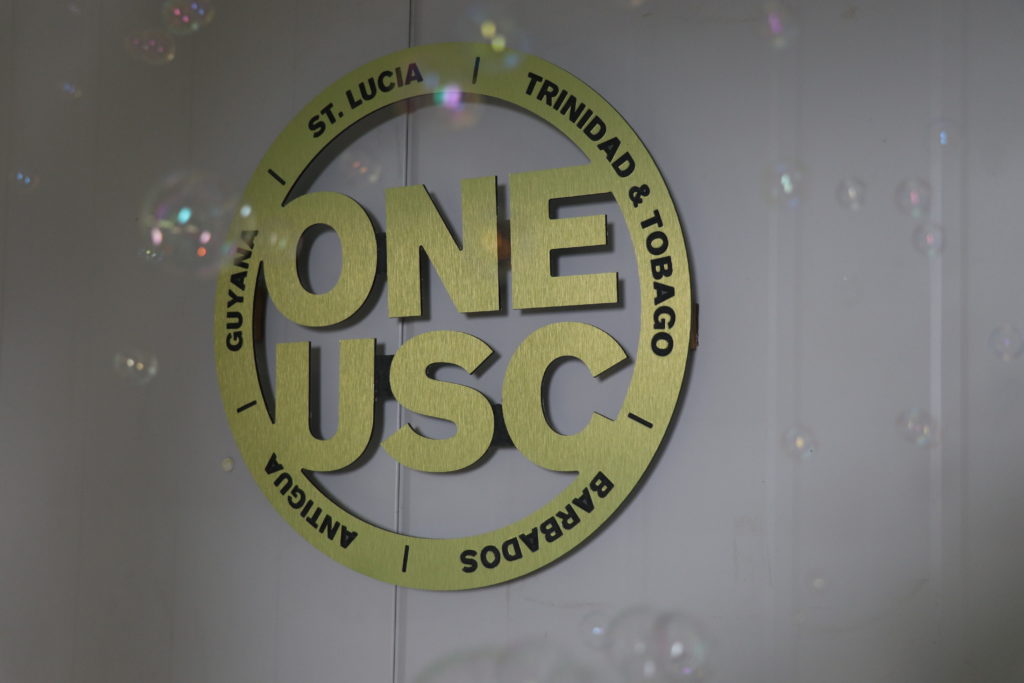
The yearly ExCam Graduation Cocktails is a celebration of the achievements of our Extension Campus (ExCam) students designed in the spirit of One USC. It was first executed in 2022 hosted by the staff of the School of Distance Education (SDE) on the Thursday prior to the graduation weekend, and that time continues to be the allotted slot for the event.
These celebrations are especially significant since it is often the first time that ExCam students visit the Main Campus and that they meet and interact with each other in a face-to-face modality.
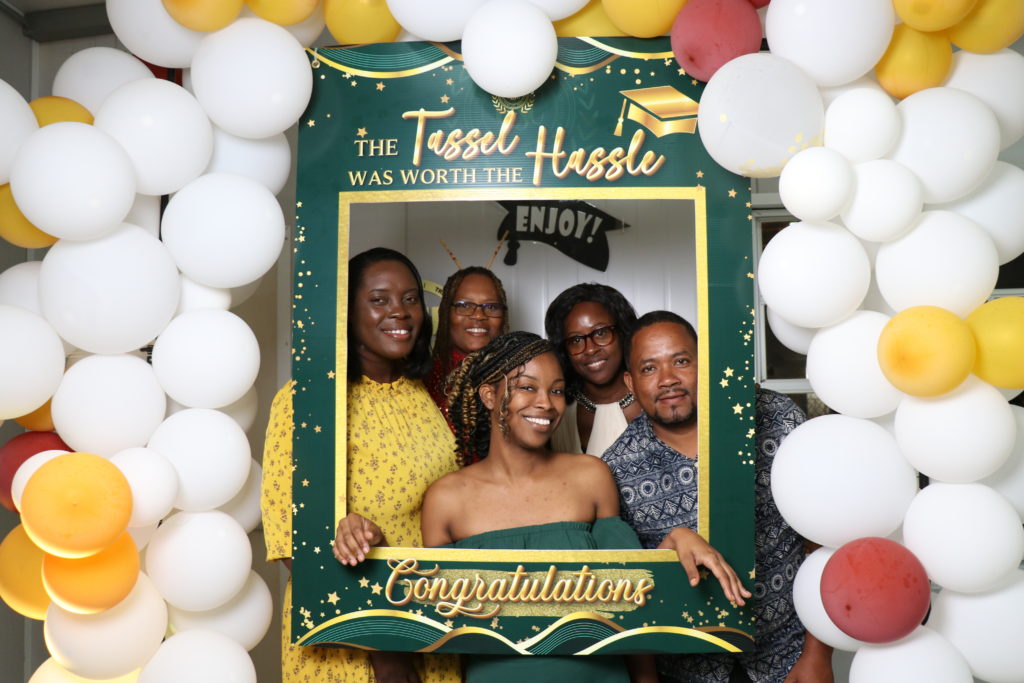
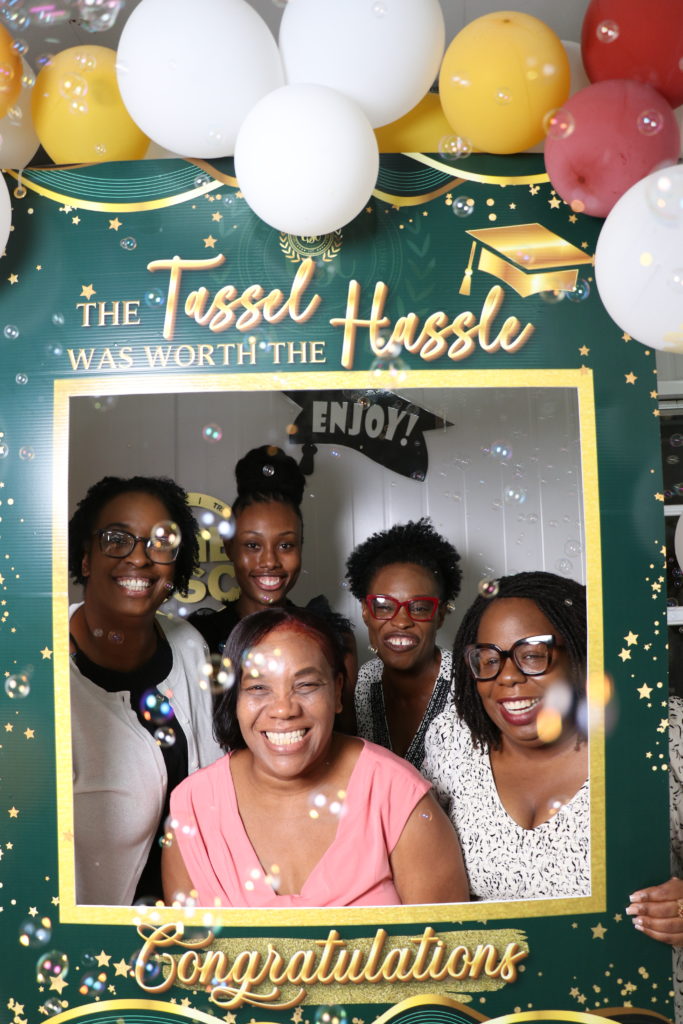
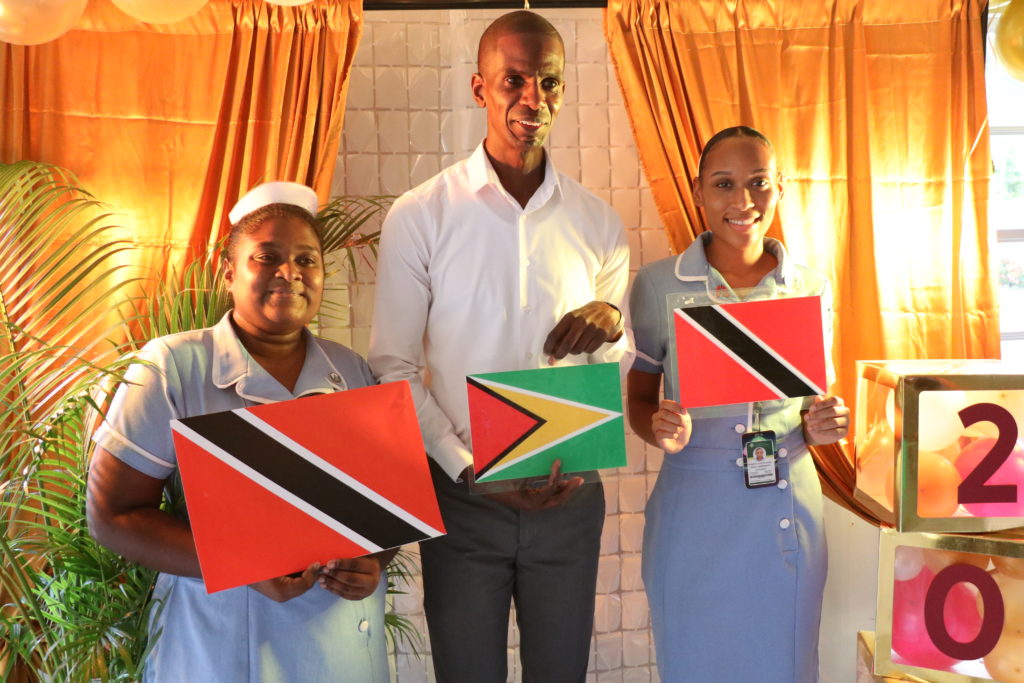
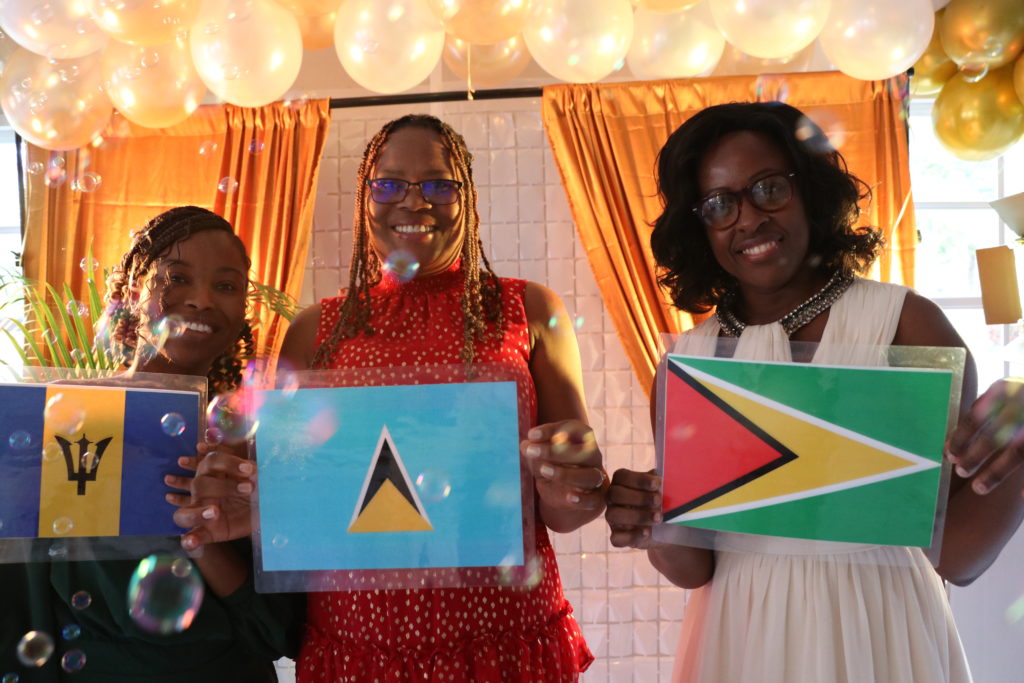
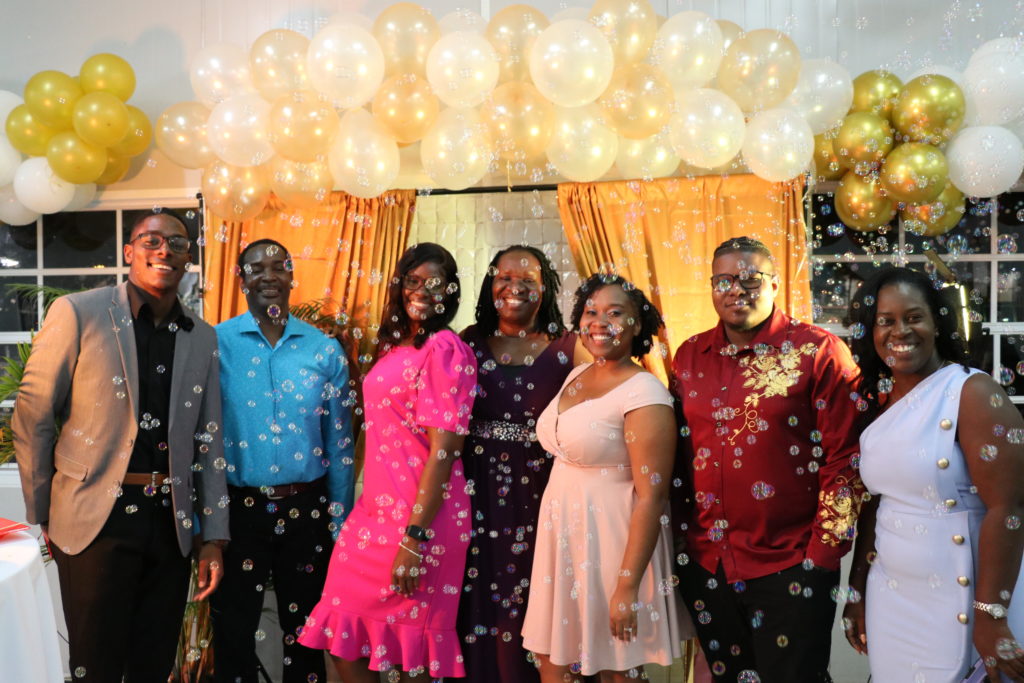
Since that first execution, the SDE team has sought to make the experience increasingly memorable. ExCam Cocktails 2023 saw the inclusion of personalised ExCam wine, and 2024 introduced photoshoot and 360º video opportunities.
Our students walk through this cocktail experience as part of their journey on the pathway from students to joyful alumni. The ExCam Graduation Cocktails provide an opportunity to close one chapter of the students’ experience with an evening of delight. It is a combination of fine food, music, thrilling games, and social interactions all in an atmosphere designed to delight the soul. Students are welcomed with a burst of colourful decorations designed around their selected class colours, a personalised programme card that can be signed by their friends and loved ones, and other mementoes of the occasion.
Senior school administrators—the USC President, Provost, Vice Presidents, Registrar, Deans and Chairs—take this opportunity to interact and socialise with graduands from the Antigua, Barbados, Guyana and St. Lucia Sites, and the San Fernando and Tobago Extension Campuses. Students also meet the Directors and Coordinators of the various ExCam locales.
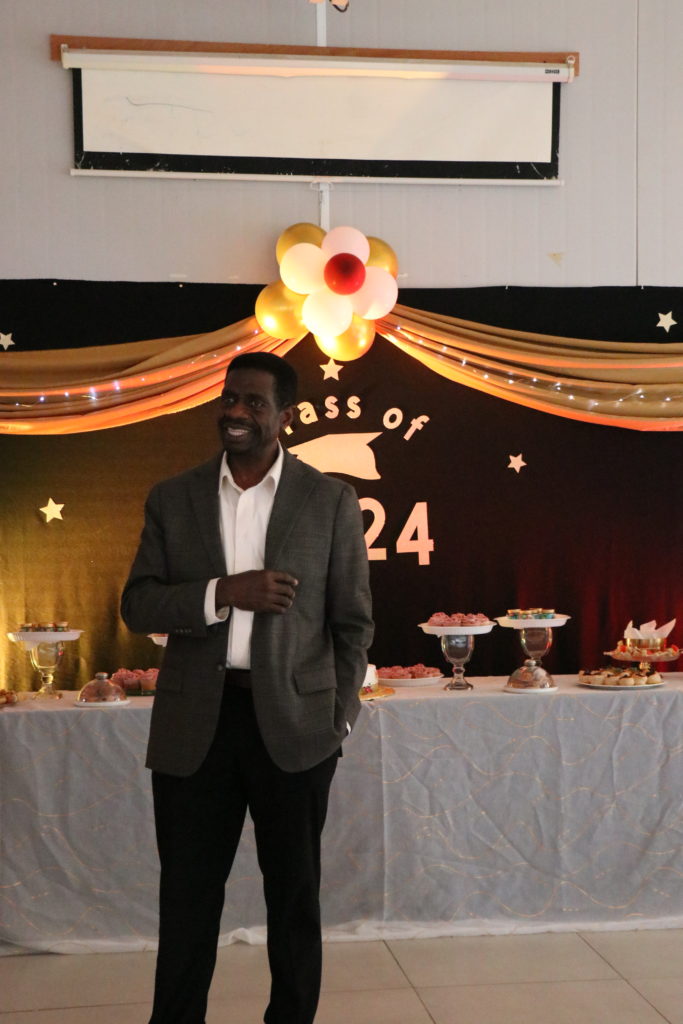
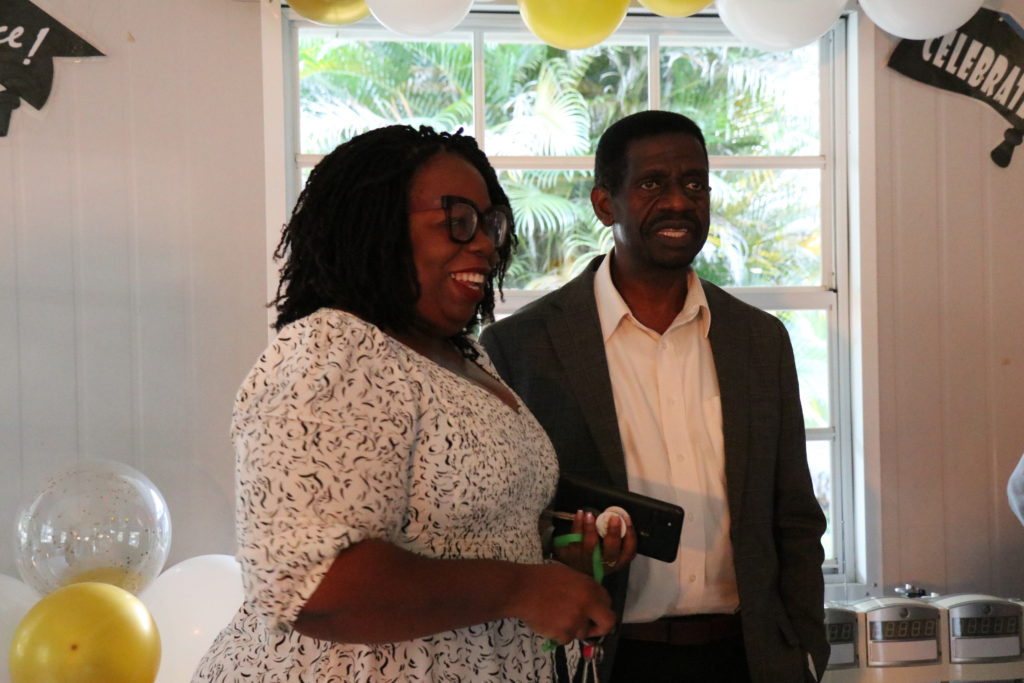
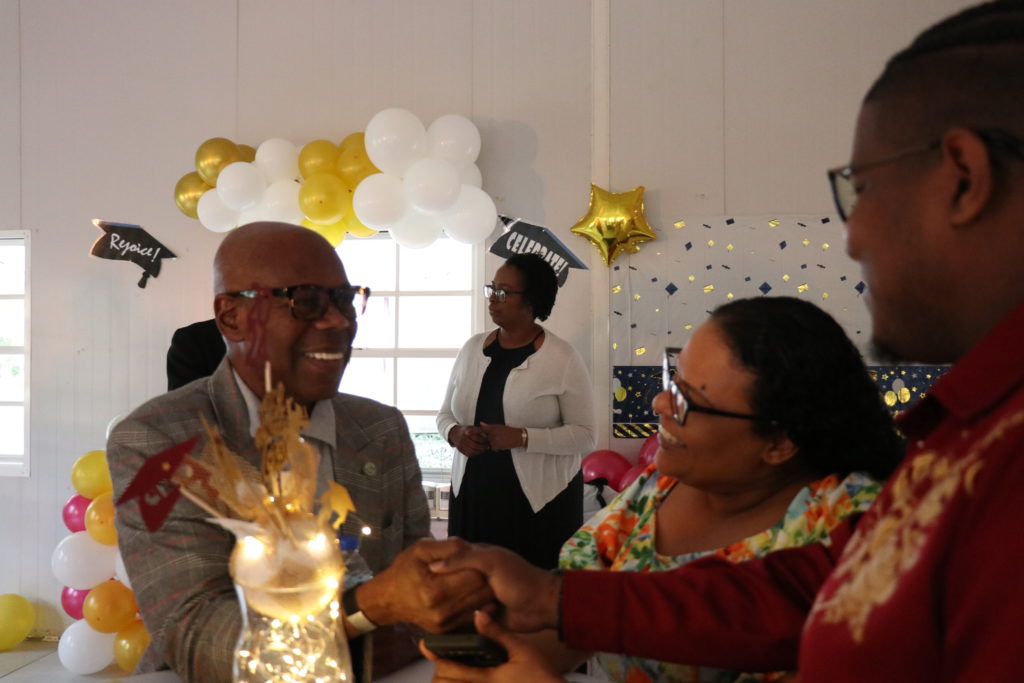
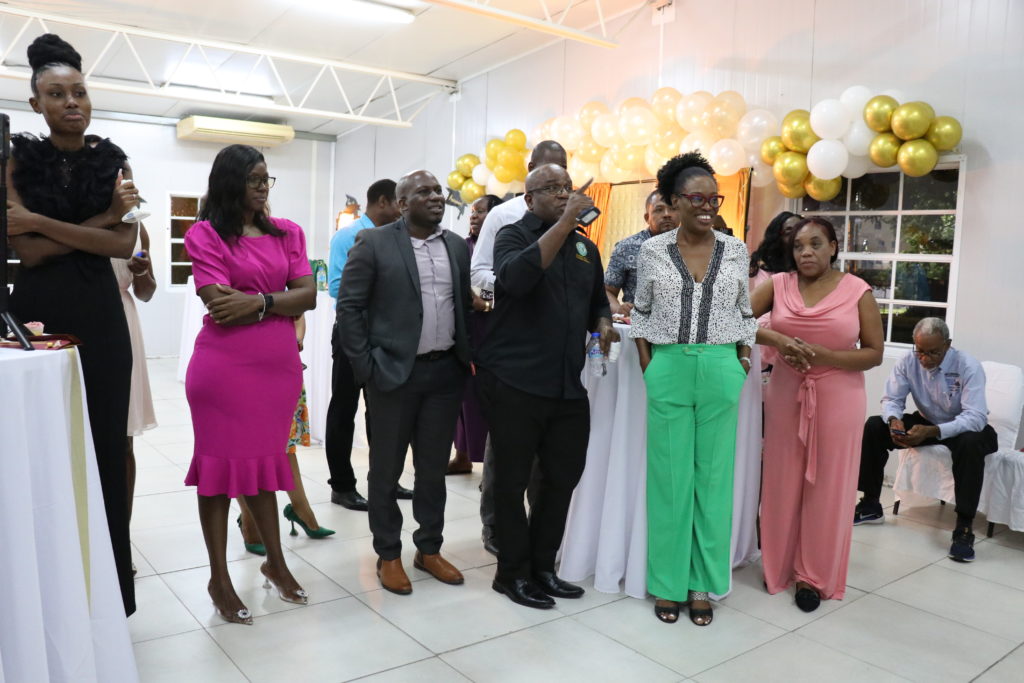
The cocktails are scheduled to run from 5:00 p.m. to 8:00 p.m.; however, it has, thus far, not finished before 10:00 p.m. One particular highlight that continually fosters total engagement and, at times, passionate competition even among senior USC administrators, is the yearly game of Jeopardy! This digital game, complete with buzzers and other accoutrements include questions related to USC, its environs, and personnel. Students win prizes for this and other games.
The Dean of the SDE specially recognises the Administration of the USC Main Campus and Extension Campuses who continue to make these events memorable with their presence, and the staff of the SDE, who work tirelessly to make the event a success. In this area, special recognition goes to Ms. Candice Alvarez and Miss Jean-Rylle Pierre, who are active in the trenches during planning and execution.
The SDE team also thanks the Administration for the financial support for this event and commits to ensuring that the experience becomes even more memorable each year. In the words of one team member, “Soon we will have to give them a hologram.”
- Published in News, President's Newsletter
Alumni Spotlight: A Journey of Faith, Learning, and Giving Back – The Remarkable Life of Dr. Roy Adams
By Ms. Simone Augustus, Corporate Communications Officer
In this Alumni Spotlight, we follow the inspiring journey of Dr. Roy Adams, a distinguished alumnus of the University of the Southern Caribbean (USC), formerly known as Caribbean Union College (CUC). Born in Carriacou, a small Grenadine island attached to Grenada, Dr. Adams’ path to CUC and his subsequent contributions to the community showcase a life dedicated to faith, education, and service.
Early Years and the Call to Ministry
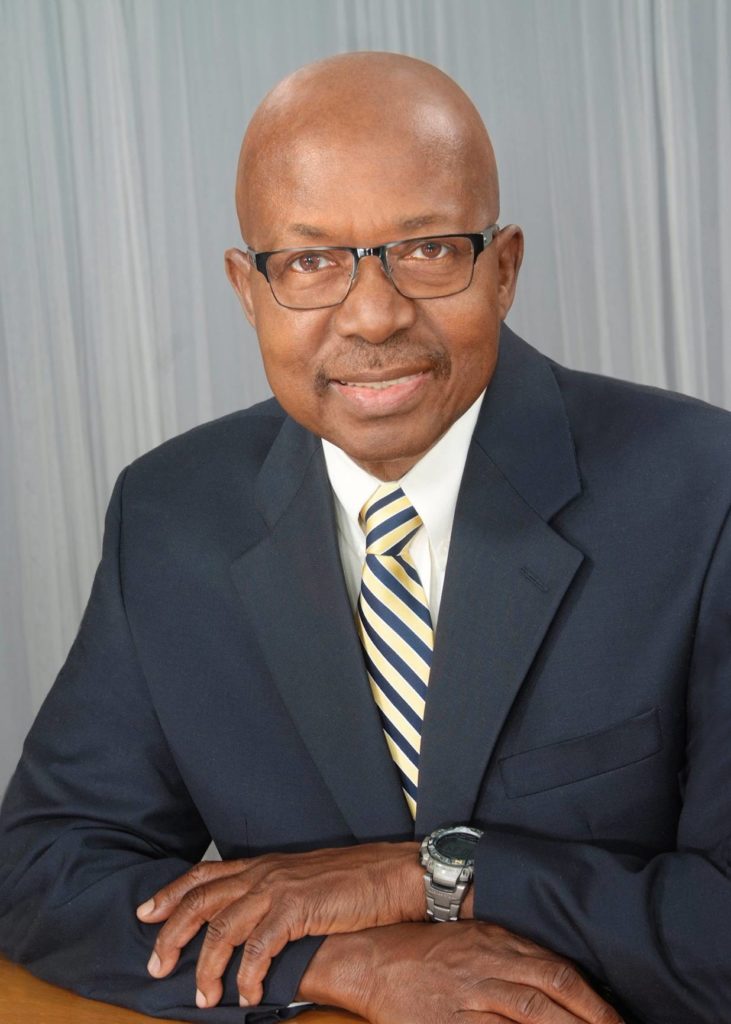
Dr. Adams’ journey began in the picturesque yet humble setting of Carriacou. When it was time for him to pursue secondary education, he was assigned to the Grenada Boys Secondary School (GBSS). This meant leaving his family and moving to Grenada, where he lived with the Davidson family, members of the St. George’s Seventh-day Adventist Church.
Reflecting on his early encounters with the Seventh-day Adventist faith, Dr. Adams recalls attending evangelistic meetings in Carriacou in a public space, because the Adventist church building has been flattened in a hurricane.
These meetings planted the seeds of faith in his heart, even though his family held deep prejudices against Seventh-day Adventists.
While living with the Davidsons in St. George’s, he attended church with them and ultimately decided to be baptized at Grand Anse Beach, a choice made discreetly to avoid further conflict with his disapproving father. This pivotal moment marked the beginning of his spiritual journey and a deepening commitment to his faith.
Despite his newfound faith, Dr. Adams initially resisted the call to ministry. A powerful appeal following a Youth Congress sermon in Port of Spain, Trinidad left him trembling, knowing he was being called to pastoral work. It was during the restless night that followed, a night plagued by cockroaches, that he fully surrendered to God’s calling. In a moment of divine clarity, he accepted his path to ministry, leading him to enroll at CUC in 1961 after raising funds by teaching at Glamorgan High School in Tobago.
Memorable Experiences at CUC
Dr. Adams’ time at CUC was filled with enriching experiences and cherished memories. “Being at CUC was one of the most marvelous times in my life,” he fondly recalls. The atmosphere, the dedicated teachers, and the administration created a nurturing environment that profoundly shaped his future.
One of the highlights of his time at CUC was the Friday evening Vespers, a spiritual oasis that he remembers with great nostalgia. “In my time, we had a sack lunch that we’d pick up at midday, and it consisted of freshly baked bread, homemade peanut butter, and condensed milk,” he reminisces. These simple yet delightful meals added to the charm of Vespers, where students gathered in anticipation, with boys on one side and girls on the other.
The camaraderie and intellectual exchange among students were equally significant. “We would go out on the porch of the old boys’ dorm and study there. Sometimes debates would take place long into the night,” he shares. These debates, conducted with the West Indian custom of arguing without becoming disagreeable, fostered critical thinking and mutual respect.
The rigorous academic environment at CUC, coupled with the support of esteemed teachers like Elder G.R. Thompson and Elder George W. Brown provided the young Dr. Adams with a strong foundation for his future ministry. He remembers the encouragement he received from his teachers, particularly the thrill of seeing a term paper returned with an “A” and the word “splendid” written across it. These affirmations played a crucial role in shaping his academic and spiritual journey.
Dr. Adams’ involvement also extended to the co-curricular realm, serving as the president of the boys’ club, while his then-girlfriend led the girls’ club. Together, they were considered the “powerhouse of the campus,” organizing events such as the annual banquet. These experiences and the strong sense of community at CUC not only honed his leadership skills but also taught him the value of respectful camaraderie.
Contributions to the USC Community
Dr. Adams has consistently given back to the USC community in meaningful ways. As a member of the board of the Alumni Association (North America) and the University’s Board of Trustees, he has been actively involved in supporting the institution. He has donated copies of his books on the sanctuary to theology students and organized book sales, with proceeds going to support needy students. Additionally, he has dedicated the proceeds from his latest book, “Revisiting the Sanctuary and its Significance within Adventism”, entirely to USC.
His commitment extends beyond financial contributions. Dr. Adams has frequently returned to USC to speak at special occasions, sharing his wisdom and experiences with the next generation of students. His dedication to USC reflects his gratitude for the education and support he received, which he credits as the foundation of his successful career.
Current Endeavors and Achievements
Now retired, Dr. Adams continues to lead a busy and fulfilling life, focusing on writing and other personal projects. Despite his retirement, he often finds himself busier than ever, reflecting the old adage, “I don’t know where I ever found time to go to work.” His recent book on the sanctuary is a testament to his ongoing commitment to theological scholarship and education. While considering it his last, he acknowledges there may be more to come, driven by leftover material and a desire to continue contributing to the field – a testament to his enduring passion for writing and sharing knowledge.
Dr. Adams’ career is marked by numerous milestones and achievements. Inspired by his mentors at CUC, he pursued advanced degrees, including a Master of Divinity from Andrews University and a Ph.D. His contributions to theological literature are significant, with ten published books, many written during his tenure as associate editor at the Adventist Review. Balancing editorial responsibilities with writing projects, he often found himself overwhelmed, yet he credits his success to divine guidance and perseverance.
Words of Wisdom for Current Students
Dr. Adams offers heartfelt advice to current USC students: “Keep your eyes on Jesus Christ. Work hard and strive for honesty and integrity. Never lose the common touch.” Drawing from his experiences, he emphasizes the importance of being true to oneself and maintaining a humble, approachable demeanor.
He recalls the words of former Grenadian Prime Minister T.A. Marryshow during a presentation at the GBSS:: “Whatever you are, be that. Whatever you say, be true. Straightforwardly act. In fact, be nobody else but you.” These principles have guided Dr. Adams throughout his life and career, serving as a beacon for those who follow in his footsteps.
Dr. Roy Adams’ journey from Carriacou to CUC and beyond is a testament to the transformative power of faith, education, and dedication. His story is one of overcoming challenges, embracing opportunities, and giving back to the community that shaped him. As we celebrate his contributions and achievements, we are reminded of the profound impact that a nurturing educational environment can have on an individual’s life and the lasting legacy they can leave for future generations.
- Published in Alumni, News, President's Newsletter
Revisiting the Sanctuary: Dr. Roy Adams’ Scholarly Journey Through Adventist Theology
By Ms. Simone Augustus, Corporate Communications Officer
Dr. Roy Adams, a distinguished theologian, former associate editor of the Adventist Review, and esteemed alumnus of Caribbean Union College (CUC), has just published his tenth book, “Revisiting the Sanctuary and its Significance within Adventism.” This latest work promises to deepen the discourse on the Adventist doctrine of the sanctuary, reflecting both scholarly rigor and personal conviction.
Understanding “Revisiting the Sanctuary”
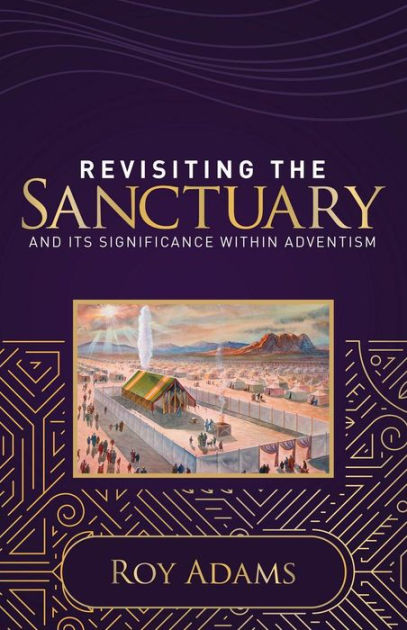
The title, “Revisiting the Sanctuary,” signifies Dr. Adams’ return to a subject he has previously explored in depth. Having already penned two books on the sanctuary, Dr. Adams approaches the topic once more, driven by both a sense of duty and an unexpected impetus. The central theme of the book revolves around the sanctuary doctrine, a cornerstone of Adventist theology, which encompasses the grand themes of justice, mercy, and the assurance of salvation. Through this book, Dr. Adams revisits this topic with fresh insights, aiming to bridge past understandings with contemporary reflections. Dr. Adams seeks to reaffirm the biblical foundation of the sanctuary and to counter the critiques that have cast doubt upon its validity.
Genesis and Goals: A Response to Challenges and a Call for Renewal
The catalyst for this book was twofold. Dr. Adams recounts an incidental remark he made during a sermon that sparked a profound response from a listener, highlighting the hunger for deeper sanctuary teaching. Soon after, Dr. Adams encountered a critical essay by Dr. Raymond F. Cottrell, a notable scholar in the Seventh-day Adventist Church, that challenged the validity of the sanctuary doctrine. This provoked Dr. Adams to not merely defend, but to articulate anew the significance of the sanctuary.
“I didn’t intend to write a book,” Dr. Adams explains. “I thought I would write an article, but it turned into a book.” The purpose of this book is to respond to Elder Cottrell’s critique and to renew interest in the sanctuary doctrine among pastors and believers, encouraging them to preach and study this vital aspect of their faith more deeply.
Research and Sources: A Scholarly Approach Rooted in Scripture
Dr. Adams’ research methodology for this book was unique, shaped significantly by the constraints of the COVID-19 pandemic. Rather than relying heavily on external sources, he focused on his extensive personal study and scriptural analysis. This approach allowed him to block out the “scholarly noise” and engage directly with the Bible to respond to Cottrell’s arguments.
While the book does reference a variety of sources, its grounding is firmly in Scripture. “The grounding of the book is in Scripture,” Dr. Adams states. This focus ensures that the response to Cottrell is not merely an intellectual exercise, but a return to the biblical foundations of the sanctuary doctrine.
Enriching Theological Scholarship
“Revisiting the Sanctuary” contributes significantly to theological scholarship and sanctuary studies by addressing contemporary criticisms and reaffirming the doctrine’s relevance. Dr. Adams acknowledges that chapters two and three delve into complex theological discussions, necessary to engage with Cottrell’s arguments comprehensively.
Despite his usual preference for more accessible writing, Dr. Adams recognizes the need for rigorous scholarship to uphold and advance the sanctuary doctrine. This book, therefore, stands as both a defense and a deepening of sanctuary theology, offering new insights and directions for future study.
Insights into the Journey: A Personal and Spiritual Exploration
Dr. Adams’ personal journey profoundly shapes his understanding and presentation of the sanctuary. From his early days as a new Adventist, studying the book of Hebrews under a tree, to his doctoral dissertation, the sanctuary has been a central theme in his spiritual and academic life.
One particularly poignant experience occurred at the Canadian border, where, with only 33 cents left in his pocket, Dr. Adams prayed for divine intervention and received it. This and other experiences underscore his belief that the sanctuary is not just theological but practical, a source of divine help and strength in times of need.
“The God of the sanctuary has meant a lot to me,” Dr. Adams shares. This personal conviction drives his response to critiques and his desire for pastors to preach about the sanctuary once more. He hopes his book will rekindle an interest in this doctrine, affirming its place as the “richest part of our theology” and demonstrating its practical relevance in the lives of believers.
In “Revisiting the Sanctuary,” Dr. Roy Adams invites readers to explore the depth and beauty of the sanctuary doctrine, blending scholarly rigor with personal faith. His book is a testament to the enduring significance of the sanctuary within Adventism, calling for renewed engagement and deeper understanding.
- Published in News, President's Newsletter

